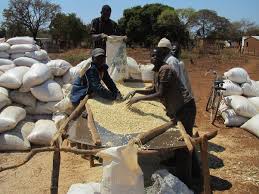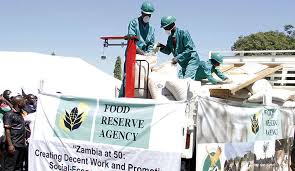Reduced maize prices will harm farmers if not administered well
Notice: Undefined index: catFilterList in /home/zambi/public_html/wp-content/plugins/wp-likes/api.php on line 243

 By Tendai Posiana, JCTR Media and Information Officer
By Tendai Posiana, JCTR Media and Information Officer
JCTR BNB Press Release Thursday 10th August, 2017 The Food Reserve Agency -FRA- announced that it will buy a 50 Kilogram bag of white maize at K60 under the 2017 crop marketing exercise which is a reduction compared to last year’s prices were a 50kilogram bag of white maize was fetching at K85.
FRA Board Chairman, Joe Simachela announced the 2017 Crop Marketing Arrangements at a media briefing held at FRA depot in Lusaka. Mr. Simachela said FRA will also buy Soybeans at K130 per 50 Kilograms.
Mr. Simachela announced that the agency will buy Paddy Rice at K70 per 40-kilogram bag. Mr. Simachela said the purchase will be restricted to 500,000 metric tons of grain as National Strategic Reserve in line with Government policy guidelines.
The pronouncement can be viewed from two different angles. On one hand, a reduced price in the 50kg bag of maize may translate to reduction in the prices of mealie meal and benefit consumers such that many will be able to afford at least two meals in a day.
Government’s expenditure on maize will reduce seeing that they will buy maize at a cheaper price. On the other hand, small-scale farmers who grew their grain with the 2016 price in mind will be greatly disadvantaged.
Government has in the past been a price setter for maize grain even though they are only mandated to buy strategic reserves. The low price therefore sends a negative signal to the market and prices, which are usually set by the buyers, may be artificially lower than what the market forces may have put it at.
This will doubly disadvantage those in rural areas who may be unable to transport their produce to a market that would offer a suitable price.
The July 2017 JC

TR Basic Needs Basket (BNB) for a family of five living in Lusaka stood at K4,859.35 which was K99.17 less than the June BNB which stood at K4,958.52.
The reduction in BNB was caused by reduction in prices of food commodities like; mealie meal which reduced from K80.4 per 25kg in June to K65.57 per 25kg in July, dry Fish reduced from K169.83 per kg in June to K113.74 per kg in July, and tomatoes reduced from K8.25 per kg in June to K7.43 per kg in July.
Non-food items like soap reduced from K5.94 in June to K4.83 in July, while charcoal reduced from K158.33 per 90kg bag in June to K143.75 per 90kg bag in July.
The drastic reduction in mealie meal prices which seems to be unique to Lusaka has been attributed to the increased availability of maize grain after the harvest season and thus a reduction in maize prices.
It is worth stating that the reduced mealie meal prices played a major part in reducing the July BNB cost of living

. Prices for Kapenta increased due to its reduced supply while the demand remained constant.
To maintain this lower price of mealie meal beyond the harvest season, the JCTR urges government to provide a conducive environment for the private sector and farmers to fairly buy and sale maize. Farmers are urged to sale maize as cooperatives as opposed to individuals to give them more market power.

JCTR people Tendai Posiana with Lloyd K Bwalya
The JCTR also urges farmers to add value to their products through the Zambia Cooperatives Federation solar hammer mills project. Further, Government is urged to be consistent when it comes to policy direction which has been lacking in the past when setting FRA floor prices and purchase targets. This is especially true since government continues to play a huge role in the sector.
The JCTR commends the purchase of soya beans and paddy rice this marketing season because it will lure more farmers to grow the two crops.
The Center however, recommends that FRA target and buy maize from vulnerable farmers especially those in rural areas who find it difficult to access markets.
A challenge to government, specifically the Ministry of Agriculture, is to put into practice the perpetual story of diversification by putting incentives that will attract farmers to grow other crops as well.
The ministry should invest in research and extension services to educate farmers on the importance of diversifying and how they can add value to their products so that the focus will not just be on the maize crop but on other crops as well.
Jesuit Centre for Theological Reflection, P.O. Box 37774, 10101 Lusaka, Zambia
Tel: 260-211-290-410 Fax: 260-211-290-759 E-mail: basicjctr@jesuits.org.zm Website: www.jctr.org.zm
Location: 3813 Martin Mwamba Road, Olympia Park, Lusaka

JCTR Media and Information Officer Tendai Posiana























